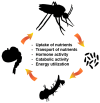Targeting Aedes aegypti Metabolism with Next-Generation Insecticides
- PMID: 36851683
- PMCID: PMC9964334
- DOI: 10.3390/v15020469
Targeting Aedes aegypti Metabolism with Next-Generation Insecticides
Abstract
Aedes aegypti is the primary vector of dengue virus (DENV), zika virus (ZIKV), and other emerging infectious diseases of concern. A key disease mitigation strategy is vector control, which relies heavily on the use of insecticides. The development of insecticide resistance poses a major threat to public health worldwide. Unfortunately, there is a limited number of chemical compounds available for vector control, and these chemicals can have off-target effects that harm invertebrate and vertebrate species. Fundamental basic science research is needed to identify novel molecular targets that can be exploited for vector control. Next-generation insecticides will have unique mechanisms of action that can be used in combination to limit selection of insecticide resistance. Further, molecular targets will be species-specific and limit off-target effects. Studies have shown that mosquitoes rely on key nutrients during multiple life cycle stages. Targeting metabolic pathways is a promising direction that can deprive mosquitoes of nutrition and interfere with development. Metabolic pathways are also important for the virus life cycle. Here, we review studies that reveal the importance of dietary and stored nutrients during mosquito development and infection and suggest strategies to identify next-generation insecticides with a focus on trehalase inhibitors.
Keywords: Aedes aegypti; cholesterol; dengue; ecdysone; insecticide; metabolism; trehalase; trehalose; triacylglycerol; zika.
Conflict of interest statement
The authors declare no conflict of interest.
Figures


References
-
- Fang Y., Shi W.Q., Wu J.T., Li Y.Y., Xue J.B., Zhang Y. Resistance to pyrethroid and organophosphate insecticides, and the geographical distribution and polymorphisms of target-site mutations in voltage-gated sodium channel and acetylcholinesterase 1 genes in Anopheles sinensis populations in Shanghai, China. Parasit. Vectors. 2019;12:396. doi: 10.1186/s13071-019-3657-7. - DOI - PMC - PubMed
Publication types
MeSH terms
Substances
Grants and funding
LinkOut - more resources
Full Text Sources
Medical

